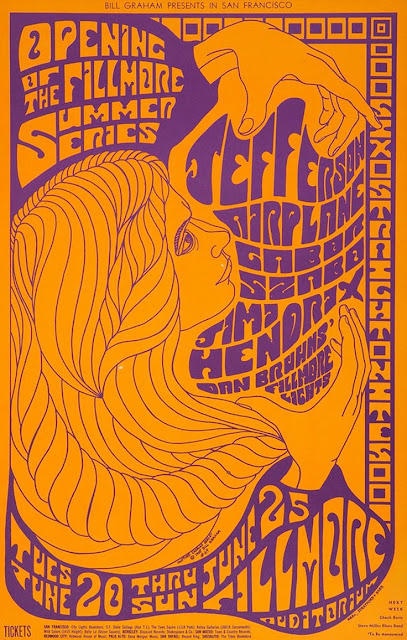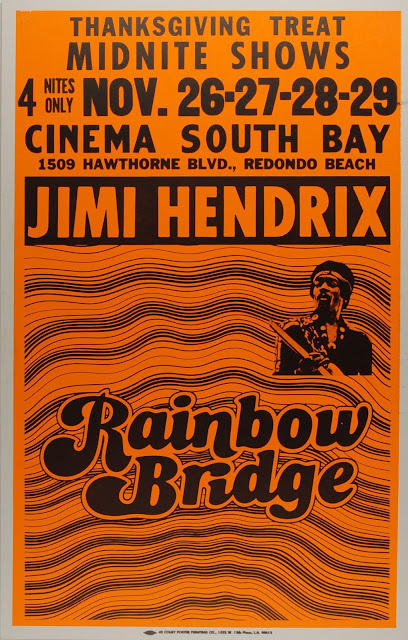FIRST PART
In November 1967, whilst at Keele University, I was involved in the student magazine Unit – edited by Tony Elliott, who was to go on to found Time Out. I suggested a Hendrix piece, as the Jimi Hendrix Experience was due to play at Manchester University Students Union. In the period since the first interview, Jimi had become a megastar and was packing in audiences up and down the country and into Europe. I travelled to Manchester with some friends and we made our way to the gig.
On arriving I found the dressing room packed with people, including Mitch and Noel – but no Jimi. I asked where he was and someone said “Check next door.” I entered the room to find Jimi alone, leaning on a radiator next to a window about fifteen or twenty feet across the room. He looked up and said, “Hello, Steve. How are you?” I didn’t think much about it at the time, but soon after, on reflection, I appreciated this as the mark of the man. Since I’d met him nine months previously, Jimi had experienced incredible success, fan adulation, and had accrued all the trappings of what was to become “the rock-star lifestyle” – hangers-on, sycophancy, pressure, freely available narcotics, etc. But he still remembered my name and behaved like a perfect gentleman, which is the way I always remember him.
The November 1967 Interview
Steve Barker: [Into microphone] Testing 8, 12, 0.
Jimi Hendrix: [Sings line from Bob Dylan’s “Just Like Tom Thumb’s Blues”] “When you’re lost in Juarez and it’s Easter time too.”
The blurb on your first LP says you are trying to “create create create.” Are you satisfied with what you’re creating?
We like to have our own sound, but we’re not satisfied, not yet. You might be pleased with what you’re doing once in a while, but never really satisfied. We’re pleased with the LP we’ve just finished, for instance [Axis: Bold as Love], but the ideas we got out of it could go on to our next one.

How far can you go with the music you’re playing now?
I don’t know. You can go on until you bore yourself to death, I guess. You got to try something else.
What will it be?
I think I’ll start all over again and come back as a king bee. [Laughs.]
You write all of your own material. Where does it come from?
Just from me. It’s like . . . er, where does it come from? I’m not sure. Like, we go to clubs a lot and all around, riding in taxis, and you happen to see a lot of things. You see everything, experience everything, as you live. Even if you’re living in a little room, you see a lot of things if you have imagination. The songs just come.

[Steve quotes a line from Jimi’s “Burning of the Midnight Lamp.”] “Loneliness is such a drag”?
That’s what it is. It really is sometimes. That was the song I liked best of all we did. I’m glad it didn’t make it big and get thrown around.
Does this mean you’re an introvert?
Well, sometimes. Right then when I wrote “Midnight Lamp” I was, but really I have to catch myself and find out. I was feeling kind of down like that. So you go on into different moods, and when you write your mood comes through. So you can go back and listen to your own records and know how you were feeling then and how your moods change at different times.
“Loneliness is such a drag” is a kind of whispery, quiet thing. How come you put these words in among powerful, extroverted music?
I like to play loud. I always did like to play loud. The words of the song just come. They mean a lot, but I don’t know how they come out. It starts off very quiet until we get into it.
How much do you owe to a blues background?
No necessarily anything! I went down South and just listened to the way the people played, and I dug it. But then I like a lot of other things too – that’s why we try to do our own stuff, make something new.
There’s been a lot of controversy over the responsibilities of pop stars. Do you yourself feel any?
That’s silly. Whatever a cat does in his private life should be his own business. Everybody knows this. But you can say it a million times, and it still won’t get through to some people. I really don’t feel responsible too much to myself – maybe that’s all. There are so much other things inside that you feel you can do. There are so many things on my mind. I could start again now – a year of creative work for us is like nothing to a lot of other groups.
Do you ever feel like going away and sorting yourself out, like Bob Dylan did?
I think that’s going to have to happen soon anyway, because everyone’s getting so tired. You work so hard sometimes, and it gets to be really frustrating. . . . Just around now it’s coming up to winter, and you’ve got to give everything a chance to work up in the spring. It’s natural. That’s when everything happens anyway – you know this – so everyone’s going to have a heart attack just ’cause the flowers are lowering their heads for a second or two.
What’s happening to you in the spring?
If I don’t get hit by a car or a train, I’ll be around.
How come you got caught up in the hippie scene?
What do you mean? [Writhes and says in a deep voice, “I’m a hippie, I’m a hippie, baby.”] No, it just happened to come about that we were around at the time of psychedelia and all the in clothes. I dug that scene, but not necessarily what you call the “hippie scene.” ’Cause I don’t like classification anyway, regardless of the scene.
We just happened to be playing freak-out and psychedelic things, but it does bother us because “psychedelic” only mean mind-expansion anyway. I can’t hear one single word the Pink Floyd are saying. It happens to us, but that’s just anybody’s opinion. There’s so many other types of music – we just happened to be in that groove, that bag, right then.
Do you try to communicate by words or sound when you’re onstage, or both?
Most of the songs we’re doing now, people know the words, I think, but it probably doesn’t mean much to them. They just want somebody to break their neck onstage.
Does this mean you write primarily for yourself?
Oh, definitely. One song we did called “I Don’t Live Today” was dedicated to the American Indian and all minority depression groups. All I did was just use a few words, and they said, “What does that mean? That doesn’t mean anything.” Eeurggh! ’Cause it was only three or four lines in there anyway.
How about straight piss-talking, like the Mothers of Invention?
I like to listen to them, but we do our own thing. You know, we had a chance to go into that bag ’cause everybody’s mind is still open, but we decided we didn’t want to go that way completely towards strict freak-out. I hit the harp on our next LP [laughs]. The words are very, very important on this next one.
Do you still dig Donovan and his golden underwear?
We go over to his house, but he’s in the States now. We have a lot of fun together.
You said the love bit wouldn’t last – looks like you’re going to be right.
This scene’s like bells and everything and all those little pseudo hippies running around flashing their little “Love, Not War” badges. Those kind won’t last because they’re going to hop on the next train, any train, that comes close to them and is easy to hop. But you don’t really know anymore what a hippie is supposed to be.
Is stage work still the most important part of your scene?
Well, tonight I was so frustrated, man. We just couldn’t get it together because we haven’t been playing in so long. We’ve been working on the LP. If we did those songs now, they’d miss half the words because the P.A. went out, and we were playing so loud. So it wouldn’t mean nothing to them if we did our new songs. Now we got to wait till the LP comes out – then we can interpret them so much better. It’s so frustrating now – we’re playing the same old songs, and they expect you to do this and do that, and then your guitar gets out of tune and you don’t get a chance to play well. I don’t like laying around. I like to play all the time.
You once wanted to do the old Bukka White song “Fixin’ to Die” as a single, but it never came out. Are there any pressures on you as to what material you record?
No, not at all. We’re just writing and playing what we want, but our moods change. Like once we wanted a Dylan song as one of our singles, then we wanted this and that. But we always wind up doing our own – regardless of whether they flop or not, at least we’re doing our own thing. If you do someone else’s song every fifth single, it shows something’s missing. But you don’t throw just anything out on record.
What do you do it all for anyway?
I like to be involved, and I like music. The same old story – all that goody-goody stuff. Music is a love to me. I love it, and the people are so nice. [In a strained, sarcastic voice] The money’s great too.
Many thanks to Steve Barker for his kindness presmission to reproduce his historical interviews.
This Jimi Hendrix interview is ©Steve Barker 2011. Used by author’s permission. All rights reserved. This interview can not be reproduced anywhere in any form without Steve Barker’s written permission

More Hendrix in Prepared Guitar

JOIN us in our Facebook Open Group
























